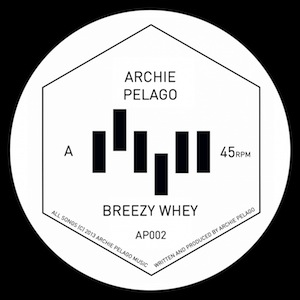Archie Pelago “Breezy Whey” b/w “Backflight”
Archie Pelago‘s music is an interesting proposition. The classically trained Brooklyn trio samples itself, catching […]

Archie Pelago‘s music is an interesting proposition. The classically trained Brooklyn trio samples itself, catching sounds on the fly and sluicing them into neat Ableton clips. The results qualify as dance music, specifically the more open-ended strains of bass music, and yet feel unencumbered by the past. The prolific group’s latest 12″, which arrives courtesy of its own Archie Pelago Music imprint, tidily summarizes the group’s appeal, but also points to some limitations. Equal amounts positive and negative space, Archie Pelago’s output has a staccato feel—and though the group pays more attention to traditional musical development than is typical or maybe even necessary for dance music, the songs seem to last exactly as long as the listener’s attention span. The music is melodic, easily assimilated, and outwardly intelligent, meaning that perhaps the only things Archie Pelago really lacks are fleshed-out low end and a certain element of surprise. Despite their complexity, we understand where these tracks are going early on—there’s little mystery about what they intend or whether the group will pull it off.
True to form, “Breezy Whey” comfortably situates the listener right away. Layered, soothingly grainy saxophones coo in rich harmonies over a pushy 707 beat, its rhythm both relaxing and anally detailed at the same time. It’s the most concise summary of Archie Pelago’s appeal we’ve heard so far—a push into dance music from outside, but from a very different stance than the noise influences that have been infusing the form for the past few years. “Backflight,” on the flip side, does away with the ambience and is almost aggressively bouncy. Its taut busyness can’t stall the track’s melodic current, but its sharply pruned clips make for a less memorable experience than the a-side. Finally, London’s Thefft steps in for a wonky “Backflight” remix, pinching the evenly spaced original into something resembling swing, but its pleated surface feels more like a coda than a lively remagining.
As always, the members of Archie Pelago display an impressive control of their materials. Not beholden to the usual orthodoxies, the group is equally deserving of praise and criticism for not sounding like anyone else; however, the music’s accessibility and completeness can come at the expense of the less immediate, intertextual rewards of dance music. This 12″ may consolidate Archie Pelago’s appeal, but it also suggests that the outfit would do well to break out of the built-in logic of its software.

